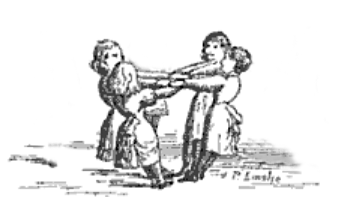Draw Me a Bucket of Water (Georgia Sea Islands Version)
This version of "Draw Me a Bucket of Water" is from the Georgia Sea Islands. There's a game that accompanies the song.
"One of my favorite singing games... 'Draw me a Bucket of Water.' It sounds complicated, but it's really not hard to do, and it's very satisfying. I've used it with 3rd and 4th graders." -Mary Jane
Draw Me a Bucket of Water (Georgia Sea Islands Version)
Children's Song
1. Draw me a bucket of water
For my oldest daughter.
We got none in the bunch,
We're all out the bunch.
You go under, sister Sally.
2. Draw me a bucket of water
For my oldest daughter.
We got one in the bunch,
And three out the bunch.
You go under, sister Sally.
3. Draw me a bucket of water
For my oldest daughter.
We got two in the bunch,
And two out the bunch.
You go under, sister Sally.
4. Draw me a bucket of water
For my oldest daughter.
We got three in the bunch,
And one out the bunch.
You go under, sister Sally.
5. Frog in the bucket,
And I can't get him out.
Frog in the bucket,
And I can't get him out.
Frog in the bucket,
And I can't get him out.
Frog in the bucket,
And I can't get him out.
6. Frog in the bucket,
And I can't get him out.
Frog in the bucket,
And I can't get him out.
Frog in the bucket,
And I can't get him out.
Frog in the bucket,
And I can't get him out.
Notes
Ms. Jones who collected this song wrote about using a bucket to draw water from the well...
"The wells what we had, the top wouldn't be on it - you know, just an open well - and they made a song about that. The frog would get in our well, because it didn't have no top on it."
That's why the song ends with the line, 'Frog in the bucket, And I can't get him out'.
Game Instructions
This game is played with 4 kids. They stand in a square. Two kids (Pair 1) stand across from each other holding hands (they keep holding hands for the whole game). The other two kids (Pair 2) stand across from each other holding hands over the other pair's hands (they keep holding hands for the whole game also).
Verse 1: They all sway back and forth while singing the 1st verse. On the last line, one of the kids (from Pair 1) goes under and inside the linked hands of the opposite pair (i.e. Pair 2 puts their linked hands on one side over that kid's back). Now one kid is "in the bunch" (i.e. inside the other kids' arms).
Verse 2: Then they all sing while swaying back and forth. On the last line of the verse, the other kid (from Pair 1) goes under and inside the linked hands of Pair 2 (i.e. they put their linked hands on one side over the kid's back). Now two kids are "in the bunch" (i.e. inside the other kids' arms).
Verse 3: They all sway back and forth while singing. On the last line of the verse, one kid from Pair 2 goes under the hands of Pair 1 (i.e. they put their linked hands on one side over that kid's back). Now three kids are "in the bunch" (i.e. inside the other kids' arms).
Verse 4: Then they all sway back and forth again while singing. On the last line of the verse, the other kid from Pair 2 goes under the hands of Pair 1 (i.e. they put their linked hands on one side over that kid's back). So now all four kids are in the bunch. They're inside each others' arms like a big embrace.
Verse 5 -6: One the last 2 verses, all four kids stay entwined and go around in a circle while singing.

Comments
The song "Draw Me a Bucket of Water" originally comes from the U.K.
"I had read that there are other versions from the UK. Several of the songs in Step it Down exist in other forms, but sung with the rhythm specific to the Georgia Sea Islands, and SE United States." -Mary Jane
*****
There's a version of this song from 1894 that can be found in "The Southern Workman" Volumes 23 - 24 (Published in Hampton, Virginia):
Draw a bucket of water
For my lady's daughter.
One in the bush
Two in the bush
Pray Miss [add name] come under.

Many thanks to Mary Jane Wilkie for sharing this song, explaining its history and for singing it for us!

Thanks!
Thanks!
Thanks and Acknowledgements
This song was collected in "Step it Down" by Bessie Jones and Bess Lomax Hawes (Harper & Row, 1972). Illustration is from "The Traditional Games of England, Scotland, and Ireland: With Tunes" (1894) edited by Alice Bertha Gomme. The illustration was edited by Lisa Yannucci.
Thank you!

























